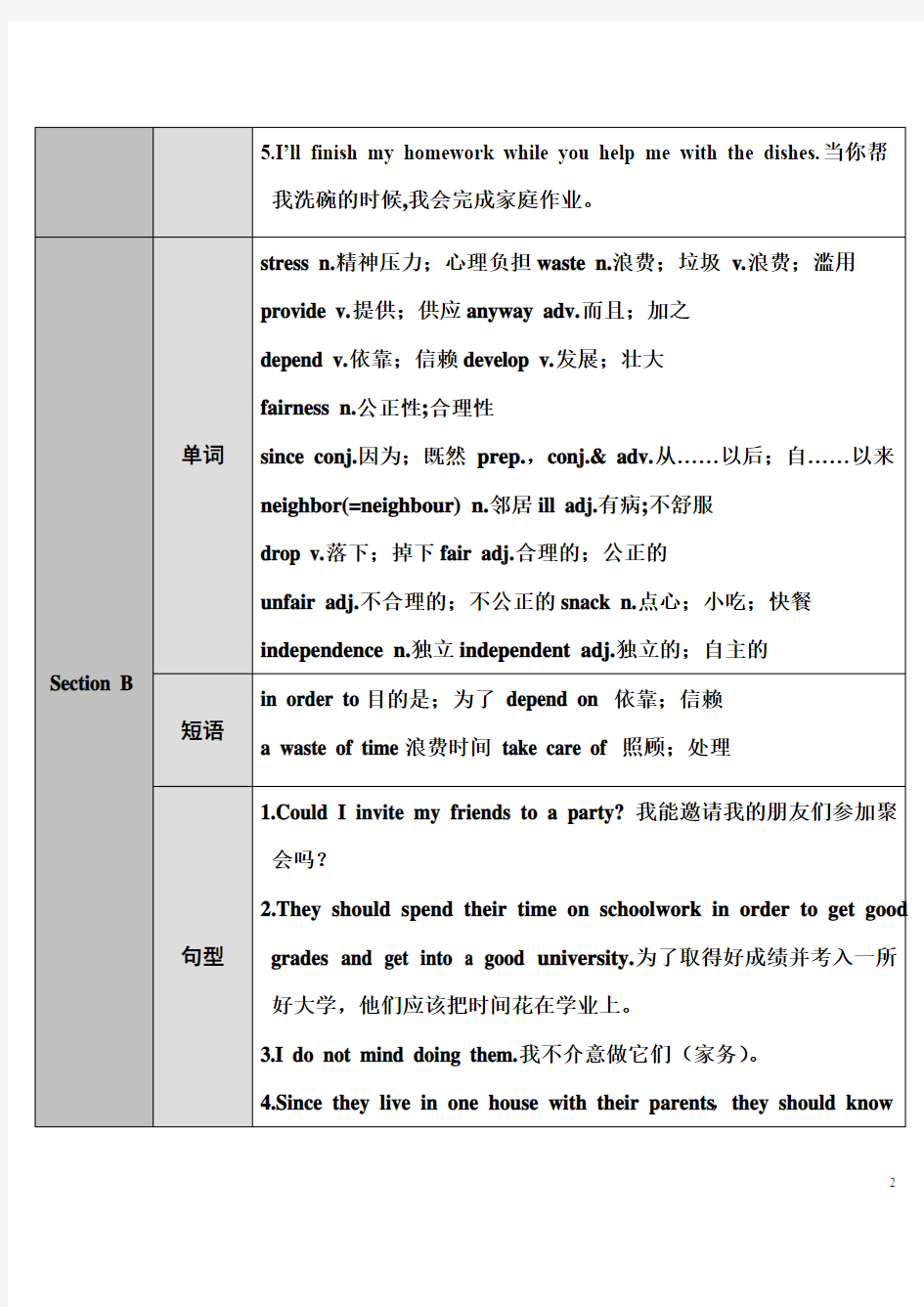

Section A 单词
rubbish n.垃圾;废弃物fold v.折叠;对折sweep v.(swept)扫;打扫
floor n.地板mess n.杂乱;不整洁throw v.(threw)扔;掷
neither adv.也不; pron.两者都不shirt n.衬衫pass v.给;递;走过;
通过
borrow v.借;借用lend v.(lent)借给;借出finger n.手指
hate v.厌恶;讨厌while conj.与……同时;当……的时候;而;然而
chore n.杂务;乏味无聊的工作snack n.点心;小吃;快餐
短语
take out the rubbish 倒垃圾all the time频繁;反复
as soon as 一……就……
句型
1.Peter,could you please take out the rubbish? 彼得,你能把垃圾
倒了吗?
2.And she won’t be happy if she sees this mess.而且如果她看到这么
乱,她会不高兴的。
3.Could I at least finish watching this show?至少等我看完这个节目
可以吗?
4.For one week, she did not do any housework and neither did I.在
—周时间里,她没有做任何家务,我也没有做。
that everyone should do their part in keeping it clean and tidy.既然
他们和父母生活在同一所房子里,他们就应该知道每个人都应该为
保持房屋的干净和整洁尽一份力。
5.The earlier kids learn to be independent,the better it is for their
future.孩子们越早学会独立,对他们的未来就越好。
语法情态动词could的用法
掌握本单元中的重点词汇及相关短语,并灵活运用。
知识目标
能力目标学会有礼貌地提出要求和请求准许。
情感目标主动地去帮助家人做杂务;学会照顾自己,培养自己的独立意识。
【课时建议】本单元建议5课时
Section A (1a~2d)………………………………………………………………………………………1课时Section A (3a~4c)……………………………………………………………………………………1课时Section B (1a~1e)……………………………………………………………………………………1课时Section B (2a~2e)……………………………………………………………………………………1课时Section B (3a~3b)……………………………………………………………………………………1课时
词汇短语:主要采用图片及多媒体展示助记法。
基本句子:采用多媒体展示及交际法展示两人进行交际时的情景。语法:通过对话练习让学生学习情态动词could的用法。
Section A 第一课时(1a~2d)
类别学习重点
重点单词rubbish, fold, sweep, floor, mess
重点短语
take out the rubbish, sweep the floor, make the bed, do the dishes, fold the
clothes
重点句式
1.I’m going to work on it now.
2.Could you please help out with a few things?
课
前
预
习
写一写
1.垃圾;废弃物rubbish
2.折叠;对折fold
3.扫;打扫sweep
4.地板floor
5.杂乱;不整洁mess
译一译
1.倒垃圾take out the rubbish
2.拖地板sweep the floor
3.整理床铺make the bed
4.叠衣服fold the clothes
背一背
1.我现在要致力于解决这个问题了。
I’m going to work on the problem now.
2.你能帮忙做几件事情吗?
Could you please help out with a few things?
新课导入
Teacher:Boys and girls,what housework do you help your mother with?
S1:I do the dishes.
S2:I help my mother wash clothes.
…
T:Very good. We are old enough to help our parents do some housework. Now please look at the pictures, and we will learn how to express them in English.
新课展示【完成教材1a~1c的教学任务】
1.学生朗读1a中的短语,教师纠正错误读音,学生识记单词并且两两提问。
2.仿照典例参考的形式两人一组互相询问对方是否做这些家务。
典例参考
A:Do you do the dishes?
B:Yes,I often do the dishes. What about you?
A:I do it two days a week.
…
3.听录音,标注出Peter和他妈妈做的家务。
2.你为什么没吃完你的午餐?
Why didn’t you finish your lunch?
活
学
活
练
1.—Could you please C the trash when you go out?
—I’m sorry I.
A. take in, mustn’t
B. put out, couldn’t
C. take out, can’t
D. look out, shouldn’t
2.—Manuel, have you finished your work?
—Sorry, I’m going to B it now.
A. work in
B. work on
C. work at
D. work over
3.你完成作业后才能看电视。
You are not allowed to watch TV until you finish your homework.
布置作业:教师引导学生课后完成本课时对应练习,并预习下一课时内容。
教
学
反
思
本课时以家庭生活话题入手,贴近学生生活,接着加入听力和对话练习,能让学生灵活地运用所学知识,增强学生的听说能力。
教学过程中老师的疑问:
教师点评和总结:
教学说明:
通过师生问答这个过程,学生复习了表示家务劳动的短语,同时加入图片导学新内容,引起学生的学习兴趣。
教学说明:
听说结合,第一时间向学生传达语言目标,通过分组对话练习,使语言目标得以强化。
Section A 第二课时(3a~4c)
类别学习重点
重点单词throw, neither, shirt, pass, borrow, lend, finger, hate, while
重点短语
all the time, throw down, as…as, in surprise, as soon as, hang out, go to the
movies
重点句式
1.Could you please take the dog for a walk?
2.She didn’t do any housework and neither did I.
3.She asked in surprise.
4.I finally understand that we need to share the housework to have a clean
and comfortable home.
课
前
预
习
写一写
1.扔;掷throw
2.也不neither
3.衬衫shirt
4.给;递pass
5.借;借用borrow
6.借给;借出lend
7.手指finger 8.厌恶hate 9.当……的时候when
译一译
1.频繁;反复all the time
2.扔下;扔掉throw down
3.和……一样as…as
4.吃惊地in surprise
背一背
1.你能去遛遛狗吗?
Could you please take the dog for a walk?
2.她什么家务活都不做,我也不做。
She did not do any housework and neither did I.
新课导入
Teacher: Do you often help your parents do the housework? Are your parents angry if you don’t do the housework? If everyone in your family doesn’t do the housework, what will happen? Today we will read a story about Nancy and her mother. Let’s read the story and see what h appened to Nancy and her mother.
新课展示【完成教材3a~3b的教学任务】
1.阅读3a短文,根据短文内容,回答问题:
(1)Why was Nancy’s mother angry with Nancy?
(2)Did they solve the problem? How?
2.朗读3b中的句子,然后认真阅读短文,标注出3b中句子的同义句,完成后让学生展示自己的答案,教师点拨。
3.再次细心阅读短文,理解每一句话的意思,小组合作解决遇到的疑难问题。
4.教师点拨短文中出现的重点和难点。
【完成教材3c的教学任务】
1.认真阅读3c中的句子,判断画线单词在句子中的词性是动词还是名词,完成后集体核对答案。
例句:You can swim. So can I.你会游泳。我也会。
(2)“so+主语+助动词/系动词/情态动词”意为“正是那样,确实如此”,表示肯定上面的观点,前面的主语和后面的主语是同一个人/物。
例句:You think she is from China. So she is.你认为她是中国人。她的确是。
(3)neither也不,两者都不。固定搭配neither…nor…意为“既不……也不……”,此短语常连接两个并列主语,谓语动词遵循“就近原则”。其反义词是both,意为“两者都”,所修饰的名词用复数形式。either意为“两者任选”,作形容词时,所修饰的名词用单数。
例句:Neither you nor I am an actor.=Neither I nor you are an actor.你和我都不是演员。
【问题探究】
1.当我叫喊时,她惊讶地往上看。
She looked up in surprise when I shouted.
2.他不喜欢下雨天,我也不喜欢。
He doesn’t like rainy days,neither do I.
活
学
活
练
1.If you don’t fold your clothes, D . You should do it by yourself.
A. so do I
B.so I do
C. neither do I
D. neither will I
2.John turned around and looked at me C .
A.in surprised
B.in surprisingly
活
学
活
练
C.in surprise
D.to my surprise
布置作业:教师引导学生课后完成本课时对应练习,并预习下一课时内容。
教
学
反
思
本课时通过三个连续的问题引入家务话题,自然过渡到课本的内容,衔接自然,接下来的语法精讲和习题互相结合,使学生对知识点的掌握进一步得到了巩固。
教学过程中老师的疑问:
教师点评和总结:
教学说明:
由家务问题入手引出本节课要学的内容,过渡自然,引起学生的兴趣。
教学说明:
将听、说、读的任务结合起来,不仅可以锻炼学生的语言综合运用能力,还巩固了学生对目标语言的学习、识记和运用,让学生学习更轻松。
Section B 第三课时(1a~1e)
类别学习重点
重点短语invite sb.to, borrow some money, go to the store 重点句式
—Could I invite my friends to a party?
—No, you can’t have a party.
课前预习写一写小吃snack
译一译 1.邀请某人到……invite sb. to 2.借钱borrow some money 背一背
我能请我的朋友参加聚会吗?
—Could I invite my friends to a party?
不,你不能举办聚会。
—No, you can’t have a party.
新课Prepare some cards with some phrases on them. One student acts according to
【问题探究】
根据汉语意思完成句子。
他们请我明晚去吃饭。They invite
me to have dinner tomorrow evening.
活学活练根据汉语意思完成句子。
我们邀请了所有的朋友。
We invited all our friends.
布置作业:教师引导学生课后完成本课时对应练习,并预习下一课时内容。
教学反思
本课时以图片和游戏的方式引入授课内容,寓教于乐,既能吸引学生的眼球,也能锻炼他们的口语表达能力,使课堂生动有趣。
教学过程中老师的疑问:
教师点评和总结:
教学说明:
寓教于乐,使学生乐学、爱学。
教学说明:
学生通过这一环节的学习能更加熟练地运用invite句型提出请求及回答,同时也对重要词组和句型进行了巩固练习。
Section B第4课时(2a~2e)
类别学习重点
重点单词
stress, waste, provide, anyway, depend, develop, fairness, since, neighbor,
ill, drop
重点短语
in order to, depend on, take care of, provide sth. for sb., as a result, do one’s
part in, do not mind doing sth.
重点句式1.They should spend their time on school work in order to get good grades.
2.There is no need for them to do it now.
3.The earlier kids learn to be independent, the better it is for their future.
课
前
预
习写一写
1.压力stress
2.浪费;垃圾waste
3.提供;供应provide
4.而且;加之anyway
5.依靠;依赖depend
6.发展develop
7.公正性fairness 8.因为;既然since
9.邻居neighbor 10.有病;不舒服ill 11.落下;掉下drop
译一译
1.为了in order to
2.依靠depend on
3.照顾take care of
4.为某人提供某物provide sth. for sb.
5.结果as a result
6.在……上尽一份力do one’s part in
7.不介意做某事do not mind doing sth.
背一背
1.为了取得好成绩他们应该花时间在学习上。
They should spend their time on school work in order to get good
grades.
2.我认为做家务没那么难。
I think doing chores is not so difficult.
3.对他们来说没有必要那么做。
There is no need for them to do it now.
4.孩子们越早学会独立,对他们的未来越好。
The earlier kids learn to be independent, the better it is for their
future.